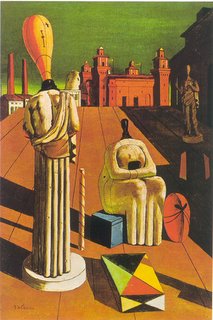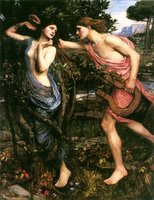 Some poet friends
Some poet friends
One of the best parts of having friends (or a wife, perhaps) who are excellent poets is that you get to hear them suffer and moan inconsolably when they're not getting published, as they wrestle with the possible insignificance and meaninglessness of their lives and their lifework.
Wait, sorry, mixed up my notes. . . . That's another aspect of having friends who are excellent poets.
One of the best parts is that you get to read and hear wonderful poetry, sometimes when you least expect it. You're sitting at work, for example, reading Sports Illustrated online feverishly finishing an important project, when, suddenly, via electronic wizardry, an email comes in that contains the complete manuscript of a new book. Voila! You now have material to read on your bus ride home.
Last week, a bundle of strange, intelligent and fascinating poems arrived on my digital doorstep from John Schertzer, a friend from Brooklyn whose work I’ve always admired. In all fairness to John, they hadn’t arrived unannounced. He mentioned that he was sending out a manuscript of his poetry collection, Explaining Paintings to a Dead Hare, and I said I’d be curious to see it. Granted, the damn thing did arrive faster than I thought humanly possible, but that’s what happens in the Information Age: If you ask to read a friend's poetry manuscript, you’d better have the bottle of Scotch open before you give the okay, otherwise, complications may arise. John was simply following one of the most important bezels of wisdom for a poet: "Make yourself ready." John Schertzer. (From the looks of this photo, I'm guessing it was taken on his secret journey to the USSR in the mid 1950s. Part of the highly classified Ubu Poetic Intelligence Mission)
John Schertzer. (From the looks of this photo, I'm guessing it was taken on his secret journey to the USSR in the mid 1950s. Part of the highly classified Ubu Poetic Intelligence Mission)
Luckily for me, I liked the work. It would be great to tell you all about John and try to offer some overview of his creative efforts. But it’s been a long, hard week, and I don’t have it in me. Instead, I’d like to share one of the poems from his collection and some of our email correspondence (by his kind permission) about the manuscript and poetry in general. So, for your viewing pleasure, and free of charge, John Schertzer:
Compass (a choreography)
The circling plane removed itself from the sky
and settled in a box of liquid.
We knew from her form
she was from out of the country
ground out of glass
till she could glide like an eel over the surface
of the waves.
There were twelve ways of looking at her, one
through a steel cylinder
flooded with supernal light, burped from the underside of a tree.
The mirror reversed itself
her double
burnt on the face on a coin flicked into the air above a lake.
The ivory or the burnished skin
in a bag by the laundry
disguised as an ectoplasmic purse
or aromatic warmer, twirled itself around
runways, felt the interface between
abstraction and moisture.
All day long we were down by the projector. We were by the broken
reactor
copying ourselves into the air, or the car.
All day long the bridge
to tomorrow hurt, the way the cables swept underground.
The copy machine
had reduced itself
to a slide show, so that the first feature was
“why are we here?” or “silver crackers, anyone?”
By the time we got control over the rest of our lives, the reel had
become a sickle over the city.
Her emblem had been awake, had redone our
shopping malls,
mauled us as we slept
in a circle, centered around our teeth,
redistributed
casually, into the next sentence,
or the next century, or something like that.
And screeched like a bell fallen from its joist
sliding down along
the hypotenuse of the roof. She spent
all day trying
to fix us, but then flew to another city.
She spent all afternoon trying to fix us, but remembered
the arc of the compass
turning above our absence of bodies.
Explaining Poems with Dada Hair
An Email Dialogue with John Schertzer
Cowboy Angel: John, I finished the book. I enjoyed it very much, though I have to say I was bummed out when Anna threw herself under the train at the end. Kind of a shocking and brutal finale. Can't you make it more of a romantic comedy or something?
John Schertzer: In the sequel it is discovered by others that Anna falls through a rather large rabbit hole (actually a hare hole—but are there such?) in the midst of the tracks and for several months has relations with a swarthy moleman from the underworld. It turns out that what they thought were her remains was just the carcass of a wild boar that had gotten too close after eating jimson weed in the sun all day.
She returns to the surface with the power to overturn the neoconservative hegemony, but there is a dark side to this.
Anna discovers that she is slowly becoming a tree, and one which produces fruit that enhances both erotic and sensory intensity, making it impossible for the Democratic party to pay attention to policy.
A third party therefore rises up from the dregs of society. These are people who are used to enhanced erotic and sensory intensity, in fact they thrive on it, and it actually becomes their policy directive.
That’s all I’m going to say for now, except that as Anna continues to grow bark (as you remember, Daphne did
 while being chased by Apollo), Global Warming seems to diminish, and everyone is worried that they are heading to another ice age. That’s when it is suddenly realized that George did not die in the tornado, after all, but that he was granted supernormal powers, and in fact scores higher than average on the math section of the SATs, which allows him to get into Yale, and he ends up being benevolent monarch some thirty years down the line. You’ll have to read the entire 14 volumes to find out how that happens. . . .
while being chased by Apollo), Global Warming seems to diminish, and everyone is worried that they are heading to another ice age. That’s when it is suddenly realized that George did not die in the tornado, after all, but that he was granted supernormal powers, and in fact scores higher than average on the math section of the SATs, which allows him to get into Yale, and he ends up being benevolent monarch some thirty years down the line. You’ll have to read the entire 14 volumes to find out how that happens. . . .CA: Only 14 volumes? Bummer. But it looks like you're already hard at work on it.
Your titles are great, by the way. I respect a person who has excellent titles. It's an underrated talent and skill. Ironically, the overall title of the book is not my favorite. It's one of the few occasions where I feel it's too obviously "surrealist."
JS: There was a performance piece by Joseph Beuys called “How to Explain Pictures to a Dead Hare.” I won’t go into all of the ramifications of using an alternation of this title (not right now, anyway), but realize that the main point is there is no explaining pictures to a dead hare, just as there is pretty much no way to explain how and why one makes some of the particular decisions one makes in one’s work (one’s writing, for instance). I was told that it was an improvement on previous titles, though I hear your point. Most recent title was “Shadow Warmer.” I really liked that one, but no one else did. What the F is a Shadow Warmer, anyway?
CA: "Shadow Warmer" was one of my favorite titles of the poems in the MS! It would also work as a book title, precisely because of its mystery.
Only one line really didn't work for me in the manuscript: From "Days' Treasury" - "There is a blue umbrella over a purple owl whose name is written on a white wall." It seems too sing-songy. And the three colors seem too much for one line. It doesn't match the rhythm or feel of most of your work.
JS: “Days’ Treasury” – I had been getting rejected so often it wasn’t funny (these days I’m rejected less often because I don’t have the time to send stuff out), and at one point I decided trying different approaches. I tried pseudonyms, writing letters to the editor that sounded like I was off my tree, and then I decided to purposely write really bad poems, or just things written off the cuff, and submit them just to see what happened. This was one of those, bad/off-the-cuff pieces – it probably took all of about 3 minutes to write, and maybe 5 to edit. I sent it off to Cortland Review, with some other similarly wielded poems, and it got accepted, go figure. Since it got accepted, I thought I might as well reconsider it and I’ve grown to like it. I hear you about the funky color arrangement. I probably was riffing off Michael Palmer’s riffing off of Goethe’s A Theory of Colors, I don’t know. Now that you point it out, there’s definitely some awkwardness there. That was originally the point, but should I continue clowning around or get serious about this??
CA: Maybe you should leave it as is and have a Notes section at the end where you tell the story. BTW, you of all people should have a NOTES section at the end. It's often my favorite part of poetry books. You'd have great notes
JS: I like the idea of notes. And at this point, I don’t care whether it seems presumptuous. Being ignored, or unnoticed, has its good points, no?
CA: Hey, can I post either "Compass (A Choreography)" or "Seventeen" on my blog? And maybe part of our emails?
JS: Post either one, your choice. Another story. I submitted a few poems to The Germ back in 1998. After about a year and a half I got a call from one of the editors saying he wanted to take the poems, and some more if I had any. It was supposed to be in the next issue (volume 4) possibly, or the next, which was supposed to be a special contemporary French poetry issue (volume 5). I missed #4, and then w/ #5 they decided to go all French – that was about 2000, 2001. Then they went missing for several years. Last year I discovered their blog site, with two of the poems I submitted, sort of an ad for the hardcopy which according to the website was supposed to be out last fall. As far as I know, there’s been no hardcopy. So I guess you can say “Compass (a choreography)” has been published by them, in a way.
And yes, post stuff from the emails too, unless it’s something that could get me in trouble, of course. Now you have me all curious about this thing you’re doing. I’m wondering what other folks I’ll be discussed alongside.

 I’ll only bring up Sandler if I have time. . . . Speaking of NOTES, what about notes on “Compass (a choreography)”? [This line never appeared in any of our emails. It’s entirely made up. Well, it’s not “made up” now, it actually exists. But it didn't exist when we were sending emails.]
I’ll only bring up Sandler if I have time. . . . Speaking of NOTES, what about notes on “Compass (a choreography)”? [This line never appeared in any of our emails. It’s entirely made up. Well, it’s not “made up” now, it actually exists. But it didn't exist when we were sending emails.]JS: I wrote the poem to read at a dance recital, or rather it was a performance of both poetry and dance. Damian VanDenburgh (I think you met him at some point) and I had been invited by Laura Ward (who now heads Octavia Cup Dance Theatre group -- http://octaviacup.org/) and her dance partner at the time, to take part in their performance at some place in Soho, or some other lofty downtown space. The poem was inspired by, or kind of a translation of my experience of, Laura’s choreography and dance at the time, which was like nothing I had ever experienced. It was kind of a modern dance, for lack of any other category, but on point, and at times it was creepy and disturbing, while at other times it was light and surprising, even funny.
Of course, this is kind of a squishy use of the word “translation,” and ultimately subjective. But it makes me think I should try doing stuff like that more often.
The explanation may have been disappointing, I know. Usually happens that way.
CA: Not at all. . . . Kind of eerie re-reading "Compass" this morning:
“The circling plane removed itself from the sky . . .”
And with a Yankee pitcher in it to boot.
CA: Hey, thanks again for the privilege of a pre-release peek at your book!
Ciao!
Read other John Schertzer poems online:
"Elizabethan Pamphlet" and "Self-styled Ceiling" at La Petite Zine.
Four poems at Reading Between A and B.
"Drop Scenes" at Shampoo Poetry.
"Dude Descending Bookcase" at Diagram.
And find out about his secret career as a corrupt Police Staff Sargeant in the Toronto Central Field Command Drug Squad. John, man, why didn't you say something?!?!

























7 comments:
Nice pictures! Who did the painting at the very top? I have a few friends who write poetry ... I've tried but I really suck at it. Your friends poem was evocative :-)
The top painting is by De Chirico, a favorite of mine -- and to my mind much more "dreamlike" than other surrealists. Dali's work, for example, does not seem truly oneiric to me.
Nice poem and nice exchange, cowboy.
I think all those poets who complain about not getting published should just go out and do a PhD program in Medieval History. That will shut them up.
Yes, the top painting is Giorgio De Chirico's "The Distrubing Muses," from 1925. The Museum of Modern Art in New York had a whole room devoted to him before they remodelled; I hope he still gets that attention. He's definitely one of my favorite painters. The photograph at the very bottom, since you didn't ask, is by Man Ray, from 1922. I forget the title. He's also a favorite.
Crystal, as a former editor of a literary journal, I can tell you that sucking at poetry has never stopped people from writing, publishing or reciting poetry. And though I don't know you, I find it hard to believe that you would really be that bad at it. You obviously write very well. I wish you had submitted to our journal rather than most of the people who did.
With the exception of Liam, of course, who is one of the excellent poets I was talking about. He rocks. And he has never once, to my knowledge, moaned about his poetry not getting published. He has bellowed, cursed and screamed in rage, but I don't remember an actual moan.
Liam, did you really just say, "Dali's work, for example, does not seem truly oneiric to me"? I agree with the content of your statement, but as your friend, I feel I should alert you to disturbing signs of PhD-itis. What's a matter you? SLAP! Dammit, aren't you watching enough Mets?
Thanks for the comments on John's poem.
Beltran's hitting is getting oneiric -- in that, it's a dream, a good dream. If the pitching staff can just hold together a bit, the Mets will make it to the series.
Man Ray I like :-) Liam writes poetry?
It is true about the badness- here's a little part from a poem about a man who killed his daughter's murderer, then put the guy in hus daughter's grave ...
Once there I laid them side by side
with arms entwined. They shall abide
in Jane’s small grave. He barely fit,
I had to scrunch him up a bit.
:-)
Crystal,
Liam writes exceptional poetry. I wasn't kidding. I've had the honor of both publishing him and hearing him read live. He's also a fine musician. Once he finishes his PhD, I hope he produces more poetry and song.
Where is this poem from that you've offered us?
re: "John, Man, why didn't you say something"
I couldn't help it. I was on a secret mission to create more script ideas for The Shield.
Post a Comment